Dark-haired Peer Schmidt (1926-2010) was a German actor, on stage from 1946. He was popular on screen during the 1950s, 1960s and 1970s in romantic roles, or as sympathetic innocents and dreamers. He was also the German voice of Gérard Philipe, Marlon Brando and Jean-Paul Belmondo.
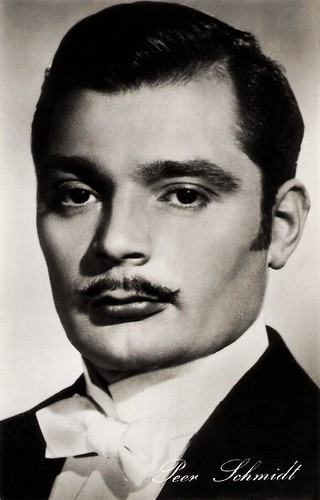
East-German postcard by VEB Progress Film-Vertrieb, Berlin, no. 1209, 1959. Photo: publicity still for Bekenntnisse des Hochstaplers Felix Krull/Confessions of Felix Krull (Kurt Hoffmann, 1957).
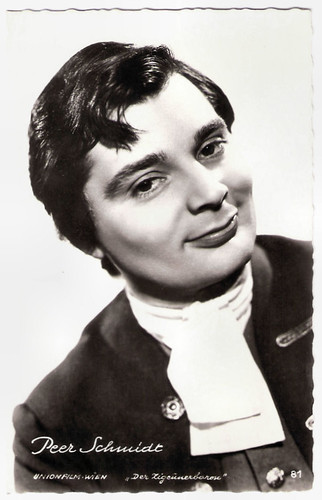
Austrian postcard by Verlag Hubmann (HDH Verlag), Wien, no. 81. Photo: Unionfilm, Wien. Publicity still for Der Zigeunerbaron/The Gypsy Baron (Kurt Wilhelm, 1962).
Peer Eugen Georg Schmidt was born in Erfurt, Germany, in 1926. Schmidt's father was a painter. Peer grew up in his hometown of Erfurt. In Berlin, he took acting lessons, but he had to stop with lessons due to military service during the Second World War.
After 1945, he played in theatres in Berlin, Frankfurt, Munich and other German cities, but also in Zurich. Between 1946 and 1955 he worked under Gustav Gründgens in Düsseldorf.
In 1953, he made his film debut at the side of Johannes Heesters in Liebeskrieg nach Noten/Love War for notes (Karl Hartl, 1953). He also appeared opposite Hardy Krüger and Ruth Leuwerik in Muss man sich gleich scheiden lassen?/Do you have to divorce? (1953).
More supporting roles followed which made him known to a wider audience. In total he appeared in more than 40 films, including Junger Mann, der alles kann/Young man who can do anything (Thomas Engel, 1957) with Georg Thomalla, Bezaubernde Arabella/Charming Arabella (Axel von Ambesser, 1959) starring Johanna von Koczian and Carlos Thompson, and Lemkes sel. Witwe/Lemke's Widow (Helmut Weiss, 1957) with Grethe Weiser.
He often played good-natured, upright, a little naive, partly dreamy and clumsy men and adventurers. In Bekenntnisse des Hochstaplers Felix Krull/Confessions of Felix Krull (Kurt Hoffmann, 1957), based on the novel by Thomas Mann, he played Marquis de Venosta whose identity Krull (Horst Buchholz) assumes.
Schmidt had another notable appearance in the international production Monte Carlo or Bust!/Those Daring Young Men in Their Jaunty Jalopies (Ken Annakin, 1969) about a car rally in the 1920s. This comedy, featuring an all-star cast including Gert Fröbe and Tony Curtis, is a sequel to the hit Those Magnificent Men in their Flying Machines (Ken Annakin, 1965). Monte Carlo or Bust! was a success among audiences and critics alike.
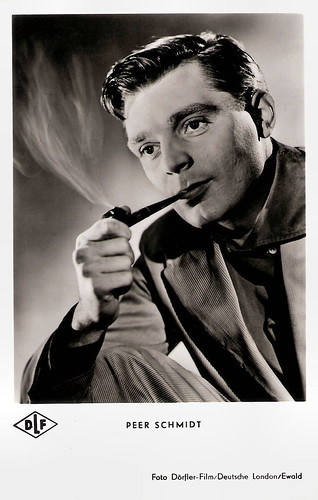
German postcard by Kunst und Bild, Berlin, no. A 1385. Photo: Dörfler-Film / Deutsche London / Ewald. Publicity still for Der doppelte Ehemann/The double Husband (Ferdinand Dörfler, 1955).
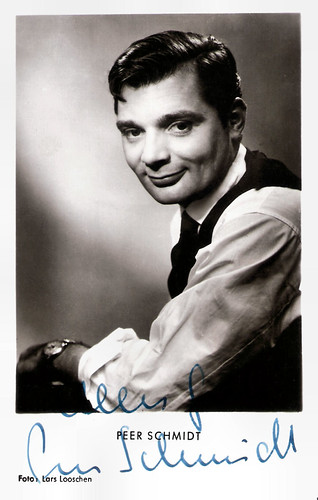
German autograph card. Photo: Lars Looschen.
From the 1960s Peer Schmidt also intensely worked as a voice actor. He lent his distinctive voice to Gérard Philipe in such films as La Chartreuse de Parme/The Charterhouse of Parma (Christian-Jaque, 1948) and to Marlon Brando in A Streetcar Named Desire (Elia Kazan, 1951), and Rod Taylor in The Time Machine (George Pal, 1960).
Between 1959 and 1975 he often dubbed Jean-Paul Belmondo, such as in Au bout de souffle/Breathless (Jean-Luc Godard, 1960) and Cartouche (Philippe de Broca, 1962).
In the meantime, he also played in several television productions. A huge success was his title role in Der kleine Doktor/The Nature Doctor (Wolfgang Becker, 1974) based on the stories by Georges Simenon. Other TV series were Cafe Wernicke (Herbert Ballmann, 1978) with Johanna von Koczian, and Die Laurents/The Laurents (Erich Neureuther, 1981) with Mathieu Carrière.
However Schmidt felt most at home in the theatre. His favourite stages were the Berlin boulevard theatres, Renaissance Theater, Theater am Kurfürstendamm and Komödie.
From 1966 until his death Peer Schmidt was married with the actress Helga Schlack. Peer Schmidt and his wife lived alternately in Berlin and on the North Sea island Amrum. Schmidt died in 2010 in a Berlin hospital. He was 84.
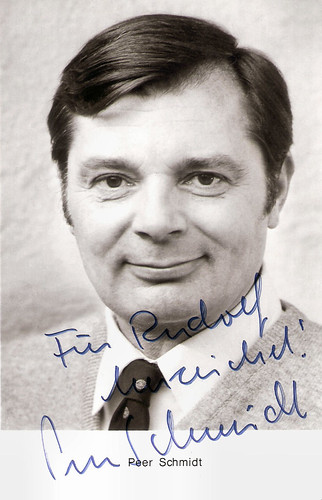
German postcard by Franz Josef Rüdel, Filmpostkartenverlag, Hamburg. Photo: H. Schlack.
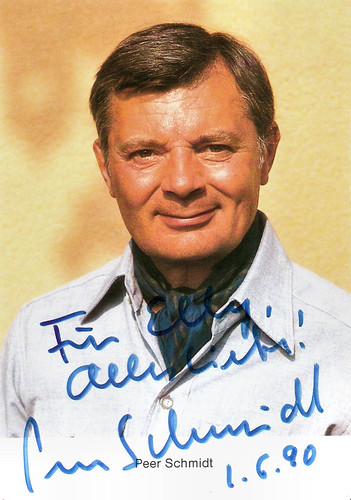
German postcard by Münch, Göttingen. Photo: H. Schlack. Signed in 1990.
Sources: Stephanie D’heil (Steffi—line - German), Wikipedia (German and English), and IMDb.

East-German postcard by VEB Progress Film-Vertrieb, Berlin, no. 1209, 1959. Photo: publicity still for Bekenntnisse des Hochstaplers Felix Krull/Confessions of Felix Krull (Kurt Hoffmann, 1957).

Austrian postcard by Verlag Hubmann (HDH Verlag), Wien, no. 81. Photo: Unionfilm, Wien. Publicity still for Der Zigeunerbaron/The Gypsy Baron (Kurt Wilhelm, 1962).
Upright, a little naive, partly dreamy and clumsy
Peer Eugen Georg Schmidt was born in Erfurt, Germany, in 1926. Schmidt's father was a painter. Peer grew up in his hometown of Erfurt. In Berlin, he took acting lessons, but he had to stop with lessons due to military service during the Second World War.
After 1945, he played in theatres in Berlin, Frankfurt, Munich and other German cities, but also in Zurich. Between 1946 and 1955 he worked under Gustav Gründgens in Düsseldorf.
In 1953, he made his film debut at the side of Johannes Heesters in Liebeskrieg nach Noten/Love War for notes (Karl Hartl, 1953). He also appeared opposite Hardy Krüger and Ruth Leuwerik in Muss man sich gleich scheiden lassen?/Do you have to divorce? (1953).
More supporting roles followed which made him known to a wider audience. In total he appeared in more than 40 films, including Junger Mann, der alles kann/Young man who can do anything (Thomas Engel, 1957) with Georg Thomalla, Bezaubernde Arabella/Charming Arabella (Axel von Ambesser, 1959) starring Johanna von Koczian and Carlos Thompson, and Lemkes sel. Witwe/Lemke's Widow (Helmut Weiss, 1957) with Grethe Weiser.
He often played good-natured, upright, a little naive, partly dreamy and clumsy men and adventurers. In Bekenntnisse des Hochstaplers Felix Krull/Confessions of Felix Krull (Kurt Hoffmann, 1957), based on the novel by Thomas Mann, he played Marquis de Venosta whose identity Krull (Horst Buchholz) assumes.
Schmidt had another notable appearance in the international production Monte Carlo or Bust!/Those Daring Young Men in Their Jaunty Jalopies (Ken Annakin, 1969) about a car rally in the 1920s. This comedy, featuring an all-star cast including Gert Fröbe and Tony Curtis, is a sequel to the hit Those Magnificent Men in their Flying Machines (Ken Annakin, 1965). Monte Carlo or Bust! was a success among audiences and critics alike.

German postcard by Kunst und Bild, Berlin, no. A 1385. Photo: Dörfler-Film / Deutsche London / Ewald. Publicity still for Der doppelte Ehemann/The double Husband (Ferdinand Dörfler, 1955).

German autograph card. Photo: Lars Looschen.
The German voice of Jean-Paul Belmondo
From the 1960s Peer Schmidt also intensely worked as a voice actor. He lent his distinctive voice to Gérard Philipe in such films as La Chartreuse de Parme/The Charterhouse of Parma (Christian-Jaque, 1948) and to Marlon Brando in A Streetcar Named Desire (Elia Kazan, 1951), and Rod Taylor in The Time Machine (George Pal, 1960).
Between 1959 and 1975 he often dubbed Jean-Paul Belmondo, such as in Au bout de souffle/Breathless (Jean-Luc Godard, 1960) and Cartouche (Philippe de Broca, 1962).
In the meantime, he also played in several television productions. A huge success was his title role in Der kleine Doktor/The Nature Doctor (Wolfgang Becker, 1974) based on the stories by Georges Simenon. Other TV series were Cafe Wernicke (Herbert Ballmann, 1978) with Johanna von Koczian, and Die Laurents/The Laurents (Erich Neureuther, 1981) with Mathieu Carrière.
However Schmidt felt most at home in the theatre. His favourite stages were the Berlin boulevard theatres, Renaissance Theater, Theater am Kurfürstendamm and Komödie.
From 1966 until his death Peer Schmidt was married with the actress Helga Schlack. Peer Schmidt and his wife lived alternately in Berlin and on the North Sea island Amrum. Schmidt died in 2010 in a Berlin hospital. He was 84.

German postcard by Franz Josef Rüdel, Filmpostkartenverlag, Hamburg. Photo: H. Schlack.

German postcard by Münch, Göttingen. Photo: H. Schlack. Signed in 1990.
Sources: Stephanie D’heil (Steffi—line - German), Wikipedia (German and English), and IMDb.
No comments:
Post a Comment